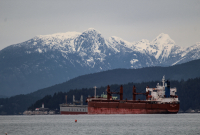Support strong Canadian climate journalism for 2025
North American natural gas prices continued their downward slide this week, in spite of frigid winter conditions that gripped much of the continent.
Even as natural gas-fired furnaces blazed in homes and businesses across the U.S. and Canada over the last week, the U.S. natural gas benchmark Henry Hub fell six per cent, trading Friday at around US$2.53 per million British thermal units, or mmBTU.
It's a continuation of last year's downward trend. U.S. natural gas prices averaged $2.57 per mmBTU in 2023, about 62 per cent below the 2022 average annual price.
Leonard Herchen, a Calgary-based analyst with energy consultancy GLJ, said weather is the single biggest driver of natural gas prices, as demand for the commodity is driven by heating needs.
He said while it may not feel like it this week, most of the fall and winter so far has been unusually mild.
Last year was also a warm winter across most of North America, leading to reduced consumption and less demand. That combined with record high natural gas production drove prices lower and also contributed to rising amounts of natural gas inventories in storage, according to a report from the U.S. Energy Information Administration.
"Storage is at really high levels. And so you need either lower production or you need a weather normalization to reduce the gas in storage, and that takes time," Herchen said.
Forecasters are expecting warmer weather to return to North America in late January and February, something that will likely weigh down natural gas prices even more, Herchen added.
While the lower prices may come as a relief to utility-bill-paying consumers, they are taking a toll on some Canadian natural gas producers.
Earlier this week, Calgary-based Birchcliff Energy Ltd. cut its quarterly dividend in half and lowered its expectations for capital spending and production for the year.
The company, which will delay the drilling of 13 planned wells due to the low commodity prices, saw its share price decline by nearly 18 per cent this week.
Tourmaline Oil Corp., Canada's largest natural gas producer, has lost close to eight per cent of its share price value in the past week, while ARC Resources fell six per cent and NuVista Energy lost 4.7 per cent of its stock value during the week.
But a recent report from ATB Capital Markets suggested many of these companies remain well-situated, with LNG Canada — Canada's first liquefied natural gas export facility — expected to begin operations later this year.
A final investment decision on the proposed Cedar LNG project is also expected this year.
"In the medium-term, we see potential in 2024-2025 to bring forward a long-anticipated step change in the egress capacity for LNG and to unlock medium-term industry growth prospects," ATB noted.
"I think most companies are not going to grow production until they see a price signal," Herchen said.
"I think that the companies are in a much better financial situation than they were a few years ago, and they're just going to weather these commodity prices for now."
This report by The Canadian Press was first published Jan. 19, 2024.





Comments
They ain't seen nothin' yet. Heat pumps and renewables gonna replace their asses.
Got to love when the fossil fuels industry says this! "Storage is at really high levels. And so you need either lower production or you need a weather normalization to reduce the gas in storage, and that takes time,"
Weather normalization. After 5 years of activity fighting any and all proposals to reduce CO2 in order to have normal weather, we gave the natural gas industry begging for normal. Sorry guys and gals, it's gone, long gone! Irregular weather and our understanding of climate is a thing of the past.